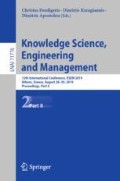Abstract
Process algebra is one of the best suitable formal methods to model smart systems based on IoT, especially Smart Factory. However, because of some uncertainty, it is necessary to model predictability of the systems, based on the uncertainty. There have been several process algebras with probability, such as, PAROMA, PACSR, etc. However they are not well suitable for the smart systems, since they are based only on discrete model or exponential model. Consequently, only simple or targeted probability can be specified and analyzed. In order to handle such limitations, the paper presents a new formal method, called dTP-Calculus, extended from the existing dT-Calculus with discrete, normal, exponential, and uniform probability models. It provides all the possible probability features for Smart Factory with complex uncertainty. The specification of the modeling will be simulated statistically for Smart Factory, and further the simulation results will be analyzed for probabilistic properties of the systems. For implementation, a tool set for the calculus has been developed in the SAVE tool suite on the ADOxx Meta-Modeling Platform, including Specifier, Analyzer and Verifier. A Smart Factory example from Audi Cell Production System has been selected as an example to demonstrate the feasibility of the approach.
Access this chapter
Tax calculation will be finalised at checkout
Purchases are for personal use only
References
IEC. White Paper: Factory of the future (2017)
Feng, C., Hillston, J.: PALOMA: a process algebra for located Markovian agents. In: Norman, G., Sanders, W. (eds.) QEST 2014. LNCS, vol. 8657, pp. 265–280. Springer, Cham (2014). https://doi.org/10.1007/978-3-319-10696-0_22
Lee, I., Philippou, A., Sokolsky, O.: Resources in process algebra. J. Logic Algebraic Program. 72(1), 98–122 (2007)
Choe, Y., Lee, M.: Process model to predict nondeterministic behavior of IoT systems. In: Proceedings of the 2nd International Workshop on Practicing Open Enterprise Modelling Within OMiLAB (PrOse) (2018)
Choe, Y., Lee, S., Lee, M.: dT-Calculus: a process algebra to model timed movements of processes. Int. J. Comput. 2, 53–62 (2017)
Choe, Y., Lee, S., Lee, M.: SAVE: an environment for visual specification and verification of IoT. In: 2016 IEEE 20th International Enterprise Distributed Object Computing Workshop (EDOCW), pp. 1–8. IEEE (2016)
Fill, H.G., Karagiannis, D.: On the conceptualisation of modeling methods using the ADOxx meta modeling platform. Proc. Enterp. Model. Inf. Syst. Architect. (EMISAJ) 8(1), 4–25 (2013)
Audi Homepage. https://www.audi-mediacenter.com/en/overview-of-audi/5702/digitalized-production-of-the-future-5708. Accessed 01 May 2019
Choe, Y., Lee, M.: Algebraic method to model secure IoT. In: Karagiannis, D., Mayr, H., Mylopoulos, J. (eds.) Domain-Specific Conceptual Modeling, pp. 335–355. Springer, Cham (2016). https://doi.org/10.1007/978-3-319-39417-6_15
Cerotti, D., Gribaudo, M., Bobbio, A., Calafate, Carlos T., Manzoni, P.: A Markovian agent model for fire propagation in outdoor environments. In: Aldini, A., Bernardo, M., Bononi, L., Cortellessa, V. (eds.) EPEW 2010. LNCS, vol. 6342, pp. 131–146. Springer, Heidelberg (2010). https://doi.org/10.1007/978-3-642-15784-4_9
Acknowledgment
This work was supported by Basic Science Research Programs through the National Research Foundation of Korea (NRF) funded by the Ministry of Education (2010-0023787), Space Core Technology Development Program through the National Research Foundation of Korea (NRF) funded by the Ministry of Science, ICT and Future Planning (NRF-2014M1A3A3A02034792), Basic Science Research Program through the National Research Foundation of Korea (NRF) funded by the Ministry of Education (NRF-2015R1D1A3A01019282), and Hyundai NGV, Korea.
Author information
Authors and Affiliations
Corresponding author
Editor information
Editors and Affiliations
Rights and permissions
Copyright information
© 2019 Springer Nature Switzerland AG
About this paper
Cite this paper
Song, J., Choe, Y., Lee, M. (2019). Application of Probabilistic Process Model for Smart Factory Systems. In: Douligeris, C., Karagiannis, D., Apostolou, D. (eds) Knowledge Science, Engineering and Management. KSEM 2019. Lecture Notes in Computer Science(), vol 11776. Springer, Cham. https://doi.org/10.1007/978-3-030-29563-9_3
Download citation
DOI: https://doi.org/10.1007/978-3-030-29563-9_3
Published:
Publisher Name: Springer, Cham
Print ISBN: 978-3-030-29562-2
Online ISBN: 978-3-030-29563-9
eBook Packages: Computer ScienceComputer Science (R0)

